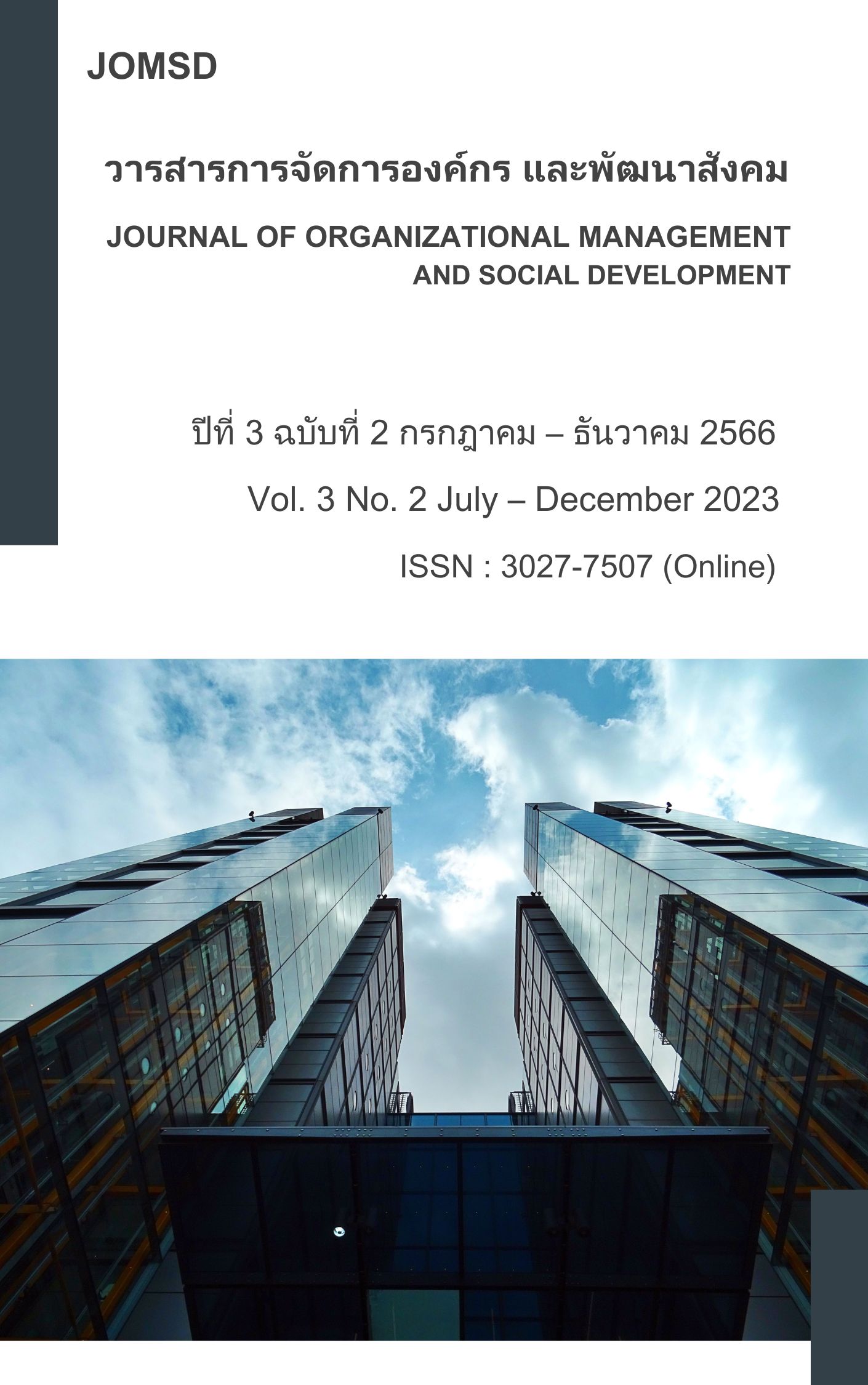Community Economic Development Sustainable Based on Local Wisdom According to The Sufficiency Economy Approach, Phon Tok Subdistrict, Tha Tum District, Surin Province
Main Article Content
Abstract
This research aims to study 1) local wisdom of Ban Phone Throw, 2) patterns in community economic development on the basis of local wisdom according to the Sufficiency Economy concept of Ban Phone Throw, and 3) transferring local wisdom, Ban Phone Throw, Phone ROK Subdistrict, They Tum District, Turin Province. This study is qualitative research. The results of the study found that 1) Ban Phone Throw has important local wisdom, including hand-woven silk, which is related to rituals and economy at the local level. Weaving folk tools and utensils that can be produced by oneself to help create convenience. 2) A model for developing the community economy based on local wisdom according to the Sufficiency Economy concept of Ban Phone Throw. Development begins with building understanding and learning in the community itself about natural resources and local culture. This will help communities understand the importance of using resources in a rational and sustainable manner. Creating a learning center Promote cooperation and develop skills in managing community enterprises. Create cooperation with the government, private sector, and international organizations. To support sustainable development of the community economy. 3) Transferring local wisdom of Ban Phone Throw. Not only does it allow traditional traditions and culture to continue. But it also creates an understanding and importance of local wisdom in strengthening the economy and social prosperity in the community. Preserving local wisdom is an important matter that every community should pay attention to and cooperate in transmitting and continuing it.
Article Details
References
คณกร สว่างเจริญ, ลักษณา เกยุราพันธ์ และพงษ์พันธ์ นารีน้อย. (2566). รูปแบบนวัตกรรมภูมิปัญญาท้องถิ่นเพื่อเสริมสร้างศักยภาพชุมชนในจังหวัด นครนายก. Journal of Roi Kaensarn Academi, 8(10), 663-680.
ธัชพล ยรรยง, พระมหากิตติ กิตฺติเมธี และพระมหาอนันต์ องฺกุรสิริ. (2561). กระบวนการบริหารจัดการวิสาหกิจชุมชนเพื่อการพัฒนาอย่างยั่งยืนกรณีศึกษา : วิสาหกิจชุมชนจังหวัดน่าน (รายงานการวิจัย). น่าน: มหาวิทยาลัยมหาจุฬาลงกรณราชวิทยาลัย วิทยาลัยสงฆ์นครน่าน เฉลิมพระเกียรติสมเด็จพระเทพรัตราชสุดาฯ สยามบรมราชกุมารี.
ธันยชนก ปะวะละ, นริศรา คําสิงห์, อมร โททํา และชัยธวัช ศิริบวรพิทักษ์. (2560). การพัฒนาเศรษฐกิจชุมชนกับสิ่งแวดล้อมตามหลักปรัชญาเศรษฐกิจพอเพียงของตำบลกําพี้ อำเภอบรบือ จังหวัดมหาสารคาม (รายงานการวิจัย). มหาสารคาม: มหาวิทยาลัยราชภัฏมหาสารคาม.
นฤมล อนุสนธิ์พัฒน์ และสุธี โกสิทธิ์. (2563). รูปแบบการพัฒนาเศรษฐกิจชุมชนท้องถิ่นไทย 4.0. วารสารสังคมศาสตร์และมานุษยวิทยาเชิงพุทธ, 5(2), 289-304.
พระปลัดวัชระ วชิรญาโณ, สิรภพ สวนดง และพระมหาสุพร รกฺขิตฺตธมฺโม. (2564). รูปแบบการถ่ายทอดภูมิปัญญาท้องถิ่นในประเพณีเชิงพุทธของประชาชนในจังหวัดสุรินทร์. วารสาร มจร บาฬีศึกษาพุทธโฆสปริทรรศน์, 7(1), 27-40.
ภัทรพล ชุ่มมี. (2565). การวิเคราะห์องค์ประกอบนวัตกรรมผลิตภัณฑ์ของธุรกิจขนาดกลางและขนาดเล็กสาขาอาหาร. วารสาร มจร พุทธปัญญาปริทรรศน์, 7(3), 217-230.
ราชบัณฑิตยสถาน. (2546). พจนานุกรมฉบับราชบัณฑิตยสถาน พ.ศ. 2542. กรุงเทพฯ: นานมีบุ๊คส์พับลิเคชั่นส์.
สัญญา สัญญาวิวัฒน์. (2534). ภูมิปัญญาไทย. กรุงเทพฯ: สถาบันไทยศึกษา.
อรชร ไกรจักร์ และขันทอง วัฒนะประดิษฐ์. (2563). ชุมชนบางวัว: สร้างต้นกล้าจิตสาธารณะ เพื่อการพัฒนาเศรษฐกิจชุมชน. วารสารสันติศึกษาปริทรรศน์ มจร, 8(1), 45-55.

